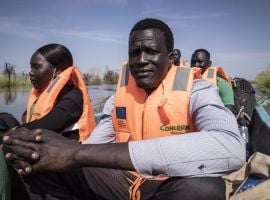
Knowledge Hub
Niger: what you need to know

The Republic of Niger consistently ranks among the poorest countries in the world. In 2020, it ranked lowest of 189 countries on the Human Development Index. In 2022, Niger ranked 115 out of 121 countries in the Global Hunger Index (GHI); and the hunger situation was categorised as ‘Serious’.
Here are five facts to explain why this landlocked country is one of the poorest in the world.
1. Food production in a harsh environment
Landlocked Niger is not just one of the world’s poorest countries, it is also one of the hottest. Moreover, Niger is expected to be one of
the five countries most affected by climate change. Four-fifths of the northern part of the country is desert, making agricultural production a challenge. That’s without the erratic rainfall patterns and frequent droughts.
The impact of this on livelihoods is significant as the economy, and the largely rural population, are strongly reliant on agriculture. When the rains do fall, it is a short season, and four severe climate-related food and nutrition crises since 2000 have exacerbated Niger’s vulnerability to food insecurity.
2. Food and nutrition insecurity is above the World Health Organisation’s ‘serious’ threshold

This vast country has a population of 24.2 million, many of whom do not have enough food to eat. Most of the population live in rural communities, where it is estimated that 80 percent are in extreme poverty. Across the Sahel, a regional belt that spans nine countries in Africa, more than 30 million face food insecurity due to poverty, conflict, and climate change.
Consequently, there is a low-life expectancy of just 63 years. In Niger, 400,000 children under five years are severely malnourished and one in five children will die before their fifth birthday.
3. The politics impacting the people of Niger
Niger gained independence from France in 1960 and French is still the official language for this largely Islamic country. The country experienced a series of coups following its independence and experienced single-party and military rule until 1991. Since 1993, there have been various democratically elected governments but access to services, especially for vulnerable populations, is still affected by budget limitations and security constraints. There is a high rate of illiteracy and many of the population rely on radio as a news source.
Compounding this already unstable situation, Niger is the epicentre of multiple regional conflicts, which spill over its borders, and the country experiences significant internal security and conflict. There are the increased security concerns caused by insecurity in Libya, spillover from the conflict in Mali and Burkina Faso, and violent extremism in north-eastern Nigeria and overall the Lake Chad Area.
Insecurity has led to the forced displacement of people from within the country and from other countries into Niger. The number of displaced people in the country was estimated to be 600,000 people at the end of December 2021.
4. Niger is one of the highest growing populations in the world

According to the UN, while Africa’s population is expected to double by 2050, it will triple in Niger. With growth rates hovering around 4% a year, coupled with the world’s highest total fertility rates, Niger’s population is the fastest-growing in the world and is one of the main reasons the country can’t break the cycle of poverty.
More people means an increased strain on already limited resources. For a country reliant on subsistence farming but at the mercy of extreme conditions and weather, this is a huge problem. Food production is simply not able to keep up with population growth. And, as more and more young Nigeriens seek employment, the economy is unable to supply enough jobs.
5. So, what can be done?

Whilst the government has made considerable investments in expanding basic services such as health and assistance programmes since 2010, confronting widespread malnutrition and poverty is limited by the financial and logistical constraints.
This is why many people rely on international agencies like Concern. In Niger, Concern is well known for the quality of its programme in the relevant areas of intervention. This is made possible through the daily work of committed staff that engage on a regular basis with the most vulnerable communities.
Concern has worked in Niger since 2003, and since 2005, we have been delivering a health, food security and education programme in the Tahoua region. This includes preventing malnutrition by strengthening the healthcare system and providing training and support in the form of medicine, therapeutic food and equipment. Concern has also supported the Ministry of Public Health to manage and prevent severe acute malnutrition among vulnerable children.
But it is not just about providing support when people are in need. Concern is working to ensure that the people of Niger also look forward to a healthy and resilient future. This includes working with the most vulnerable families to enable them to successfully grow their own food and help them find alternative ways to earn a living.






